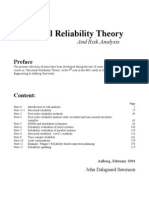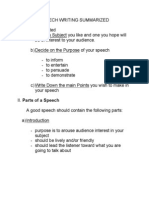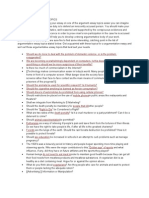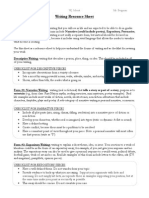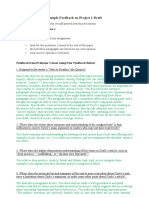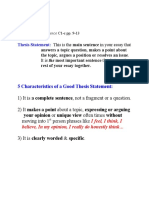Ethos Pathos Logos
Ethos Pathos Logos
Uploaded by
Henry NadongCopyright:
Available Formats
Ethos Pathos Logos
Ethos Pathos Logos
Uploaded by
Henry NadongCopyright
Available Formats
Share this document
Did you find this document useful?
Is this content inappropriate?
Copyright:
Available Formats
Ethos Pathos Logos
Ethos Pathos Logos
Uploaded by
Henry NadongCopyright:
Available Formats
ETHOS, PATHOS, and LOGOS
The goal of a lot of academic writing is argumentative: a successful paper can convince its readers to change their minds, to look at a problem differently, or to consider a new solution. Readers, however, can be hard to convince! So, more than two thousand years ago, Aristotle described three different strategies (sometimes called rhetorical appeals) that writers and speakers can use to make their arguments more convincing. Be careful, however, because not every appeal is appropriate for every kind of argument. For example, theres no place in a scientific research paper for an appeal to emotion. In many essays and speeches, however, teachers will ask you to practice using all three appeals. As you can see, some of them overlap, while others conflict. Used wisely, however, they can work together to make your argument as convincing as possible. Ethos: Establishing Character Arguments using ethos (sometimes called ethical appeals) emphasize your trustworthiness. This reasonable, well-informed person believes this, they imply, so maybe the reader should, too. They make an effort to establish your authority, fairness, and connection with readers. To show that you are someone whose ideas are worth listening to, you might: State your experience and credentials directly: As a trained paramedic with six years of experience, I have seen.. Use specific, concrete examples which display the depth of your knowledge. Anyone can say that drinking and driving is bad, but someone whos been at the scene of many crashes knows details that the readers dont. Use those details! Choose words that show how knowledgeable you are. If your readers know the subject youre writing about, make sure you use the terms associated with that subject. If you r readers are unfamiliar with it, use a few of the terms and make sure to define them. Show that your opinion is shared by other expert authorities: in 2012, researchers at Harvard found that even more accidents involve alcohol. Use evidence from the most unbiased sources you can find. Refer respectfully to people and positions with which you disagree. Avoid words and ideas which may offend some readers unnecessarily. Show what you have in common with people and positions with which you disagree. Mention your opponents strongest arguments, not just their weakest ones, and respond to those arguments carefully and thoughtfully. Show how your own perspective has changed over time, if it has. Show your own respect for your argument by carefully proofreading your paper. Pathos: Appealing to Emotion Arguments based on pathos (sometimes called emotional appeals) encourage readers to make a decision based on emotions like anger, pity, or fear. Many people who wont change their minds based on logical argument are willing to do so when their emotions are involved, which is why so many political advertisements use them. Appeals to emotion are usually discouraged in formal academic writing, but there are many essays and speeches in which theyre appropriate. To a ppeal to your audiences emotions, you might: Use vivid, concrete language in telling a story about a specific example. Focus on the example of someone who is especially vulnerable or appealing, such as a toddler or honor student killed in a car accident.
Connect those examples to particularly startling or uncomfortable facts and statistics that youve found in your research (her experience was not unusual; 60% of the drivers on the road that night were legally drunk) Use language that emphasizes the positive (hardworking, law-abiding, helpful ) or powerless (frail, tiny, terrified) qualities of people you perceive as victims. Use language that emphasizes the negative (irresponsible, careless) qualities of people or institutions you believe to be at fault.
Logos: Appealing to Reason Arguments based on logos (sometimes called logical appeals) involve claims and evidence that establish your skill in reasoning. Logos is the most academic of the three kinds of appeals, and its an important part of every college writing assignment. To show that you have carefully thought through the topic youre exploring, youll want to: Look carefully at your own assumptions: are there any circumstances under which they might not be true? If so, you may not want to base an argument on them. Avoid logical fallacies. o Dont assume that one even caused another event just because it came first. o Dont assume that one persons experience is typical of other peoples experiences. o Dont assume that there are only two options. Word your claims carefully: dont make statements about everyone or everywhere or always unless there are no possible exceptions. Back up each of your claims with quotations, statistics, or examples. o Make sure your evidence comes from respected experts and authorities. o Use recent sources (less than five years old) whenever possible: newer research may contradict some older sources. Use historical or scientific comparisons when appropriate.
Spring 2013
Pocatello REND 323 208-282-3662
I.S.U. Writing Center Student Success Center www.isu.edu/success/writing
Idaho Falls CHE 220 208-282-7925
You might also like
- Emergency Response PlanDocument1 pageEmergency Response Planharveen balanNo ratings yet
- Middle School Debate RubricDocument1 pageMiddle School Debate Rubricapi-246100949No ratings yet
- Accident Reporting ProcedureDocument2 pagesAccident Reporting ProcedurebmkallarackalNo ratings yet
- Part1 High Voltage Engineering PDFDocument67 pagesPart1 High Voltage Engineering PDFQais Alsafasfeh0% (1)
- Notes Reliability Theory 2004Document231 pagesNotes Reliability Theory 2004abduldanNo ratings yet
- Air Traffic Control (Atc) Related Accidents and Incidents.a Human Factors AnalysisDocument4 pagesAir Traffic Control (Atc) Related Accidents and Incidents.a Human Factors AnalysisNick Lok100% (1)
- How To Write An Argumentative Essay in 9 Easy StepsDocument3 pagesHow To Write An Argumentative Essay in 9 Easy StepsMohammed AlhashdiNo ratings yet
- Different Perspectives in Arguments or Discursive WritingDocument5 pagesDifferent Perspectives in Arguments or Discursive WritingracheltalisaNo ratings yet
- Ethos, Pathos, LogosDocument1 pageEthos, Pathos, Logosankenym7708100% (1)
- Logos Pathos Ethos-Ppt1Document12 pagesLogos Pathos Ethos-Ppt1api-297627652100% (2)
- Using Persuasive Language Techniques For The PitchDocument2 pagesUsing Persuasive Language Techniques For The Pitchapi-250301089No ratings yet
- Hedging LanguageDocument2 pagesHedging LanguageSafat Al Mamun RonoNo ratings yet
- Logos Ethos PathosDocument1 pageLogos Ethos PathosEd CormodeNo ratings yet
- Essay Writing (IELTS)Document3 pagesEssay Writing (IELTS)Gigi GuastellaNo ratings yet
- Speech WritingDocument3 pagesSpeech Writingklumer_xNo ratings yet
- Shaping A Young Male MindDocument1 pageShaping A Young Male MindmslenihanNo ratings yet
- Task 9 Quick Wr-Wps OfficeDocument24 pagesTask 9 Quick Wr-Wps OfficeBubuy AriateNo ratings yet
- G7.Q4.M3 7Document13 pagesG7.Q4.M3 7Ludovina CalcañaNo ratings yet
- Writing A Counterargument and RefutationDocument3 pagesWriting A Counterargument and RefutationHossam Abu-Baker100% (1)
- Formal ReportDocument2 pagesFormal ReportKhensley Gira ColegaNo ratings yet
- Fiction & NonfictionDocument10 pagesFiction & NonfictionAdrienne PattNo ratings yet
- Opinion Planner OverviewDocument14 pagesOpinion Planner Overviewapi-525241634No ratings yet
- Argumentative Essay TopicsDocument3 pagesArgumentative Essay TopicsJeramaeNo ratings yet
- Personal Narrative PrewritingDocument1 pagePersonal Narrative PrewritingDerrith DunnNo ratings yet
- Essay Writing Types and TopicsDocument11 pagesEssay Writing Types and TopicswasabiwafflesNo ratings yet
- Argumentative Essay TopicsDocument2 pagesArgumentative Essay TopicsAnicaNo ratings yet
- The Speech Writing Process HandoutDocument3 pagesThe Speech Writing Process HandoutRoland John MarzanNo ratings yet
- Argumentative EssaysDocument2 pagesArgumentative EssaysAllisonYang100% (1)
- PEE 2marks With AnswersDocument32 pagesPEE 2marks With AnswersSARANYANo ratings yet
- English - G8 - Q2 - W3-4 - Samantha Bea GasingDocument10 pagesEnglish - G8 - Q2 - W3-4 - Samantha Bea GasingGennrick PajaronNo ratings yet
- B1 Level Supplementary Reading Material For Author S Purpose and Tone AUTHOR's PURPOSEDocument6 pagesB1 Level Supplementary Reading Material For Author S Purpose and Tone AUTHOR's PURPOSEPhúc Nguyễn100% (1)
- An Argumentative Essay: How To..Document19 pagesAn Argumentative Essay: How To..Mohsin MushtaqNo ratings yet
- English 11 Forms of WritingDocument2 pagesEnglish 11 Forms of Writingapi-266273096No ratings yet
- Edexcel GCSE English Language Paper 1 MSDocument13 pagesEdexcel GCSE English Language Paper 1 MSShibraj Deb100% (1)
- Reading Strategies and SkillsDocument6 pagesReading Strategies and SkillsDesnitaNo ratings yet
- Sample Feedback Critical Review Draft 2Document2 pagesSample Feedback Critical Review Draft 2José Ernesto Alonso100% (2)
- Persuasive Writing: 2. Importance 3. Traditional Method 4. ARGU Model 5. Steps and Examples 6. Logical FallaciesDocument26 pagesPersuasive Writing: 2. Importance 3. Traditional Method 4. ARGU Model 5. Steps and Examples 6. Logical FallaciesRohma ImranNo ratings yet
- Opinion Paragraph PDFDocument14 pagesOpinion Paragraph PDFvund309920% (1)
- How To Write A Newspaper ArticleDocument1 pageHow To Write A Newspaper ArticleEstefane Abigail OyNo ratings yet
- Persuasive EssaysDocument11 pagesPersuasive EssaysZAKIA MUSHTAQNo ratings yet
- Thesis Statement:: This Is The Main Sentence in Your Essay ThatDocument3 pagesThesis Statement:: This Is The Main Sentence in Your Essay ThatJoy Irish Fallejo DoNo ratings yet
- Summary of The ArticleDocument2 pagesSummary of The ArticleМаргарита БилдаеваNo ratings yet
- Skills - Builder - Booklet - Y9 RevisedDocument9 pagesSkills - Builder - Booklet - Y9 RevisedJosephine ThongNo ratings yet
- Expository Writing Worksheet PDFDocument2 pagesExpository Writing Worksheet PDFGlyndaNo ratings yet
- Other Words For-TeachthisDocument7 pagesOther Words For-Teachthisapi-309081002No ratings yet
- Persuasive Techniques WorksheetDocument2 pagesPersuasive Techniques WorksheetMs-Devashia T WhyteNo ratings yet
- Argumentative Essay WritingDocument5 pagesArgumentative Essay WritingRiefki FajarNo ratings yet
- Q4 Week 1Document50 pagesQ4 Week 1Jen nagumNo ratings yet
- Peer Review WorkshopDocument3 pagesPeer Review Workshopapi-272853754100% (1)
- Writing Articles (Worksheet)Document4 pagesWriting Articles (Worksheet)arioliNo ratings yet
- Essay Thesis Statement TemplateDocument7 pagesEssay Thesis Statement TemplateGina Rizzo100% (1)
- Transactional WritingDocument2 pagesTransactional WritingM MNo ratings yet
- Rubric Skills Based Ap ArgumentativeDocument1 pageRubric Skills Based Ap Argumentativeapi-251125746No ratings yet
- Logos, Ethos and PathosDocument1 pageLogos, Ethos and PathosMatthew LambertiNo ratings yet
- English 10 Q2 W3 DAY2 ARGUMENTATION-MODAL VERBSDocument33 pagesEnglish 10 Q2 W3 DAY2 ARGUMENTATION-MODAL VERBSNOEL MENDOZANo ratings yet
- PORTFOLIO Essays On Advantages and Disadvantages CLASSDocument5 pagesPORTFOLIO Essays On Advantages and Disadvantages CLASSVicen PozoNo ratings yet
- Wordy SentencesDocument30 pagesWordy SentencesLeo KingNo ratings yet
- Essay Writing A Brief Guide: by David RuddDocument13 pagesEssay Writing A Brief Guide: by David RuddGiai CuNo ratings yet
- Context CluesDocument7 pagesContext Cluesartosolivia04No ratings yet
- Classify T: Detailed Lesson Plan in English - Grade 7Document23 pagesClassify T: Detailed Lesson Plan in English - Grade 7Diana arcangelNo ratings yet
- Eapp Q1 Week1 L2 Features of Academic WritingDocument37 pagesEapp Q1 Week1 L2 Features of Academic WritingChloe CanalesNo ratings yet
- How To Pass AQA Papers 1 & 2 PowerPointDocument11 pagesHow To Pass AQA Papers 1 & 2 PowerPointTonyNo ratings yet
- PersuasiveDocument3 pagesPersuasiveagri_agreeNo ratings yet
- Classical Argument Thesis IdeasDocument6 pagesClassical Argument Thesis Ideasdnppn50e100% (1)
- How To Write A Thesis For A Rhetorical Analysis PaperDocument6 pagesHow To Write A Thesis For A Rhetorical Analysis Paperafjryiome100% (1)
- My Personal GoalsDocument4 pagesMy Personal GoalsHenry NadongNo ratings yet
- Learnings & Importance of TheaterDocument9 pagesLearnings & Importance of TheaterHenry NadongNo ratings yet
- FilmingtheIdeasWordProblem PDFDocument1 pageFilmingtheIdeasWordProblem PDFHenry NadongNo ratings yet
- PH.D Presentation January 20 2018 Gloria HotelDocument15 pagesPH.D Presentation January 20 2018 Gloria HotelHenry NadongNo ratings yet
- CarouselBrainstorming PDFDocument1 pageCarouselBrainstorming PDFHenry NadongNo ratings yet
- Essay Writing ProcessDocument29 pagesEssay Writing ProcessHenry NadongNo ratings yet
- All Debate MotionsDocument113 pagesAll Debate MotionsMilena KovačevićNo ratings yet
- Sample of A Topic WebDocument1 pageSample of A Topic WebHenry NadongNo ratings yet
- Bloom's Revised TaxonomyDocument1 pageBloom's Revised TaxonomyHenry NadongNo ratings yet
- History of The PhilippinesDocument149 pagesHistory of The PhilippinesHenry NadongNo ratings yet
- NJ MVC Driver ManualDocument115 pagesNJ MVC Driver ManualAbominabil Bestie100% (1)
- Applying Human FactorsDocument29 pagesApplying Human FactorssebastienNo ratings yet
- EASA MMEL Airbus - A300 600 18 13092013Document2 pagesEASA MMEL Airbus - A300 600 18 13092013Sptyan SammzNo ratings yet
- 1CD R5 PDFDocument81 pages1CD R5 PDFEduardo MuñizNo ratings yet
- Police Log February 13, 2016Document12 pagesPolice Log February 13, 2016MansfieldMAPoliceNo ratings yet
- Day 1 4 HF and CRMDocument44 pagesDay 1 4 HF and CRMagusNo ratings yet
- Mastering Physics CH 10 HW College Physics I LCCCDocument29 pagesMastering Physics CH 10 HW College Physics I LCCCSamuel100% (11)
- Materials Handling & StorageDocument13 pagesMaterials Handling & StorageRene Raynes100% (1)
- Chapter 2 Chemical KineticsDocument83 pagesChapter 2 Chemical KineticsRaymond KakalaNo ratings yet
- Body General PDFDocument41 pagesBody General PDFoz23No ratings yet
- 12 PDO Heat TransferDocument55 pages12 PDO Heat Transferaxel2100No ratings yet
- Exp 4-Rate LawDocument9 pagesExp 4-Rate Lawtkjing100% (1)
- CRM Training ManualDocument220 pagesCRM Training ManualSHERIEF100% (1)
- Big Hero 6 PaperDocument4 pagesBig Hero 6 PapermisslilangellNo ratings yet
- Restitution LetterDocument1 pageRestitution LetterRobert FloresNo ratings yet
- PM 01 Hira For Excavation of Boiler FoundationDocument3 pagesPM 01 Hira For Excavation of Boiler FoundationSyed Shariq Hassan100% (1)
- 2002 Chevrolet S10 ManualDocument458 pages2002 Chevrolet S10 ManualWil ParedesNo ratings yet
- Marine InsuranceDocument1 pageMarine InsurancePeanutButter 'n JellyNo ratings yet
- Soal Bahasa Inggris Kls X SMADocument7 pagesSoal Bahasa Inggris Kls X SMAdwiwiraNo ratings yet
- 2020 항공철도사고 사례집 (항공) -복사-복사Document226 pages2020 항공철도사고 사례집 (항공) -복사-복사송태웅No ratings yet
- Battle of GettysburgDocument90 pagesBattle of Gettysburgcuttrman100% (2)
- Aiims Hospital Disaster PlanDocument6 pagesAiims Hospital Disaster PlanSujatha J JayabalNo ratings yet
- TL - Caltex Vs Sulpicio Lines, GR No. 131166 Sept. 30, 1999Document7 pagesTL - Caltex Vs Sulpicio Lines, GR No. 131166 Sept. 30, 1999Jec Luceriaga BiraquitNo ratings yet
- AV9296 19JUN BOGBGA - Provisional Loadsheet Edno 1Document2 pagesAV9296 19JUN BOGBGA - Provisional Loadsheet Edno 1brayan osorioNo ratings yet




